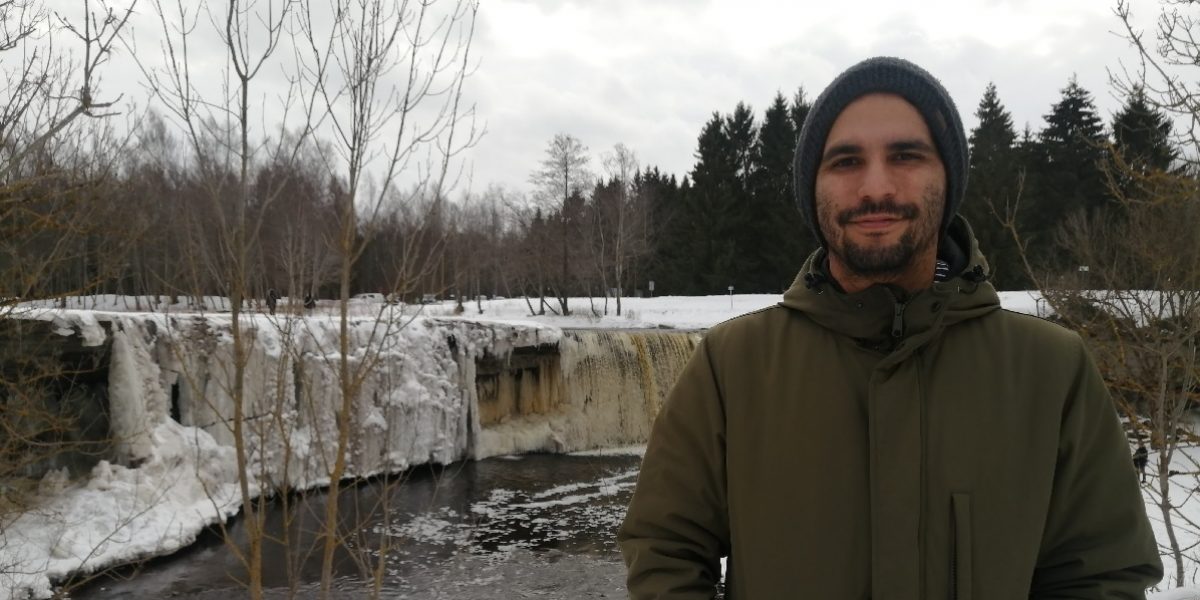
Carlos Antonio Quiros Duran, a student from Costa Rica, was interviewed about his experience of studying at the master’s programme “Quantitative Economics” at the University of Tartu in Estonia.
Are you happy that you chose the University of Tartu?
I certainly feel proud to be a student at the University of Tartu (UT). Before coming to Estonia, I did my research about the University and its history, but it is until the moment that you join and start experiencing the “University culture” and how Tartu is developed around it that you can realize you made the right choice.
The entire city seems to be a big campus. Anywhere you go, there are University of Tartu facilities and faculties serving and helping the people that live here. In addition, UT continues investing in infrastructure and innovation, motivating students to find areas they could be passionate about, all of that while igniting the start-up spirit that has been characterizing Estonia in the last few years.
What are some things you didn’t expect about Estonia?
Being from Latin America makes you feel a bit nervous about facing Estonia’s winter. You can do your research and bring a coat from home, shoes, etc., but you still have not experienced -25 degrees ever. And of course, you always wonder if you will be able to communicate with Estonians? How friendly might they be? Will cultural differences be something crucial? and so on. But what I did not expect is that it was just the opposite. Since day one, the first Estonians I met were very friendly, wondering how they may help me and offering to assist with language in case I needed it. I understood that this was a great place to be. Regarding the winter cold, you can always get a good coat and shoes, problem solved.
Something more concrete that surprised me is the amount of daylight you get during summer and winter. Summer, endless days, beautiful, difficult to set time apart to study because you think the day is not over yet. And winter, very short days, starts getting dark at 3 pm at some point. These changes were a surprise because, in Costa Rica, you always get 12 hours of daylight and 12 hours to enjoy the night. Certainly a change you adapt and start identifying how nice winter activities are.
What do you study at UT? Could you tell us a bit about your programme?
I study Quantitative Economics. During my years of working experience, I identified that between different companies I worked at there were subjects I wanted to learn, contribute, and apply to different opening positions, but I did not have the background required.
Quantitative Economics sets you in the middle of economics and data analytics. You learn how to code in different programming environments, but just as important it challenges you to explain and interpret what those results mean in economics and how they might impact decisions at different levels. There are many economics courses in the programme. You can always complement optional courses from other faculties if you want to learn more from areas you are passionate about.

Could you describe your application process?
It was the easiest and most user-friendly application process I used, especially compared to others from Europe. Dreamapply was exactly that, “a dream.” All the information and communication needed were managed through the application portal. My motivation letter and paperwork could be uploaded into their webpage, and it was not until you were officially admitted that you mailed them the original documentation requested. Plus, you were always up-to-date on the status of your application.
One additional process student applicants from other continents besides Europe should consider is the application for a long-term visa. If you live in Latin America, you need to travel to New York in the United States (I think you can also go to Brazil now, but still) to get it. Applying for a long-term visa is part of any process to join a university in any country, and for Estonia, it is an important step to keep in mind.
What do you think has been the most valuable for you in the programme so far?
Everything for me has been new. My background is in Electronics Engineering, and I decided to change it to the field of economics. Therefore, I have found useful information and acquired new knowledge in any of the courses I have taken. Also, this programme provides you with perspective of how economic and business decisions are made and areas to consider if you would like to start your own business.
How international is your programme?
Most of my classmates are from other parts of Europe, but there are also people from Africa and Asia. I am the only one who moved from Latin America; nevertheless, the options are open to everyone, and I would encourage those who are interested in applying. You end up studying or sharing experiences with people from different cultures and traditions, which opens the door to learning many other things beyond the classroom.
What were the most exciting courses that you have taken apart from your mandatory courses?
Game Theory and Behavioral Economics have been my two favorite courses. The first one teaches you how decisions can be made between different parties and how there will be a common ground between trust and economic benefit for the parties. And the second course describes how people make decisions every day that differ from economic theory, and this specific analysis is very recent in the economic world.
What kinds of things are there to do in Tartu?
Fortunately, there are many activities you can do in Tartu throughout the whole year. You can swim at the Emajõgi river or run across the city for exercise during spring and summer. There are restaurants and bars to hang on after long days after the library or classes.
Personally, I have also found different Latin dance studios, where I have been surprised by the great number of Estonians who are learning and, most importantly, enjoying how to dance salsa and bachata.
Tartu is beautiful during wintertime. By walking just 15 minutes from the city center, you will find the sky tracks and rent the equipment right there or use the sled area in case you prefer that. Starting from December, Tartu inaugurates its Christmas city, which I think is a very cozy area to walk by, drink some Glögi (hot wine with lemon, VanaTallinn – Estonian liquor, and almonds) and make use of the skating ring together with friends (PS, if you have never skated before, don’t be afraid, it is quite fun).
One of the best places to go in Estonia is ERM (Estonian National Museum). It is an amazing building, and you can learn many details about Estonian culture, heritage, gastronomy; definitely, a place I have visited more than once.
What are your plans after graduation? Do you think there are a lot of job opportunities in Estonia?
How “easy or fast” you will find a job in Estonia depends on your area of expertise or what you study at University. My plans are to stay; I am in love with this country and this city, people have been incredibly nice to me, and there are many things to continue experiencing here.
Estonia is growing too fast, and the areas that are driving that expansion are IT and Biomedicine, but also the country motivates everyone to become entrepreneurs and facilitates the opportunities for opening your own company, so my advice does not cross that option off your list, if you cannot find the job you like or want, then create it.
At this moment, I am working at a technology company, and I am fortunate I will be able to do my master’s thesis there. They have provided me with all the support to continue University, attend class, meet my deadlines, and time-off to focus on exams; therefore, I’d recommend people that if they want to work and study at the same time to always keep in mind, our studies should come first, it is what we came here for, and having a solid basis of what we are learning will pay-off at the moment, we need to find a job.
If you could give any advice to your freshman-year self, what would it be?
Learn about courses offered by other programmes; there are definitely some interesting classes that you can take as optional and complement even more your knowledge. Also, keep learning Estonian. Learning this language is a challenge, but something that can and will be used in your day-to-day life, and the best thing is that Estonians are willing to practice with foreigners.
Learn more about the Quantitative Economics programme at the University of Tartu, Estonia, here.



